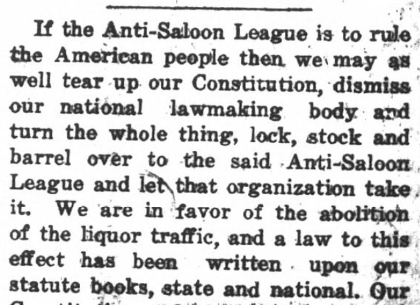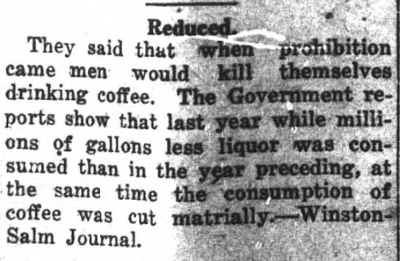Thanks to our partners at the University of North Carolina at Chapel Hill and the Badin Historic Museum, as well as funding from the Library Services and Technology Act (LSTA), we are excited to announce new issues of The Badin Tribune are available now on our website!
Ratified in 1919, the 18th Amendment to the United States Constitution officially banned the production, sale, and transportation of alcohol in what became known as the Prohibition era. However, North Carolina had barred alcohol from the state twelve years earlier with a referendum vote. This did not stop residents of the Tar Heel state from consuming alcohol, though. Bootleggers transported the illegal goods across state lines, and moonshiners made money by cooking up their own liquor.
Located in Stanly County, Badin also felt the effects of Prohibition. These editions of The Badin Tribune from 1920-1921 report on the successes and failures of Prohibition in North Carolina. Residents saw the initial passing of prohibition law in 1905 as the success of state rights. However, Badin residents became antsy over the passing of a federal amendment, unhappy with the lawmakers in Washington, D.C., passing legislation for the entire country. An August 28, 1920, edition of the paper contains a heated response to this issue, arguing that members of Congress spit on states’ rights by codling extremist prohibition activists. The December 11, 1920, paper echoed a similar sentiment, declaring that although they supported prohibition, they feared the Anti-Saloon League was gaining too much power. The Anti-Saloon League was a political organization pushing national acceptance of the temperance movement. Their efforts were not received well in Badin; once the 18th Amendment passed, residents found the organization irrelevant and more of a nuisance than a champion of moral codes.
Although the Badin residents had their issues with prohibition fanatics, they did embrace the idea of a world without alcohol. The November 27, 1920, paper proclaimed that, like women’s suffrage, the law was “here to stay.” The September 25, 1920, edition reported on the new law’s success, reducing alcohol consumption by millions of gallons.
The addition of the 21st Amendment in 1933 repealed the effects of Prohibition. North Carolina remained a dry state until 1937 with the creation of the Alcohol Beverage Control (ABC) system, though bootlegging and moonshine remained commonplace.
To read more about Prohibition in North Carolina, read our article here.
To learn more about the Badin Historic Museum, click here.
To see all editions of The Badin Tribune, click here.


